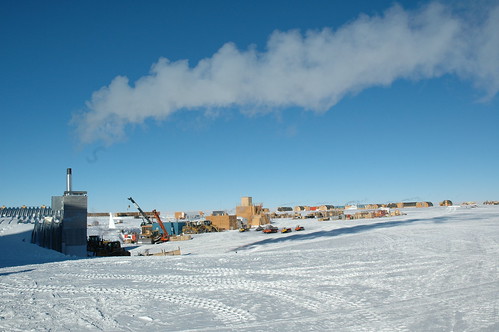First week of Winter

Eighty-six people in the middle of the vastest space of white and blue I have ever seen, and the station starts to break.
Two days after we said goodbye to our last plane, I heard the bad news at lunch from one of the maintenance workers on station. Not many people besides upper management knew yet our sewage outfall was blocked. We were on the emergency sewage outfall, but we couldn't stay on it for long. Sewage is dealt with here by piping it into huge holes deep under the snow. The pipes are heat traced down to 200 ft so that the lovely waste doesn't freeze. Either the heat trace failed, or some other unforeseen blockage is going on, because the pipes are completely blocked at 74 ft, and the plumber's "snakes" we have for breaking blockages aren't coming anywhere close to penetrating it. The bad news is, the same thing happened 2 winters ago, and the station stayed on the emergency sewar outfall all winter. So it's too full for us to stay on it for too long. In the immortal words of our maintenance foreman, "then it's buckets for y'all." So there's a possibility we'll go down as the winter where everyone had to use buckets. What a claim to fame.
Just when news gets around about the sewar problem, another issue crept up, this one even scarier than the idea of peeing in a bucket for 8 months. I first got an inkling of what might be happening when I heard an unusual page over our station-wide all-call address system. It was the power plant mechanic. "Bill Henrikson, come to the Power Plant." This was strange for several reasons. One: Bill Henrikson is our top dog on station--people don't usually involve him in petty problems. Two: people don't usually give such direct orders over the all-call. They might politely request that someone call such and such a number, but a command like that was very odd. Three: the usually very relaxed power plant mechanic was doing little to hide the serious nervousness in his voice. And four: it was the POWER PLANT.... the thing that gives us heat and keeps us from freezing. About a half hour later, a nervous Bill Henrikson comes over the all-call and makes an announcement to science groups to turn off or secure their instruments because there's trouble with the power plant. "We probably won't lose power", he says, "but just in case. There could be a significant spike, drop, or change in frequency." Just then I hear a call for me over the radio. I have to call comms, where Bill has been stationed to orchestrate the power plant problem. When I call, I'm asked to go out to a far part of station and turn off the liquid nitrogen plant, which is eating up a lot of power. Apparently, the generator switch today didn't go so well and only the weakest one is able to run. They're going to put part of the station on an emergency satellite generator. I grab a snowmobile and head out. Sure enough, the station loses power a few minutes later. Luckily, this outage wasn't long, but the implications were a tad scary. If a failure like this could happen now, what if it happens when it's cold and dark?
<

0 Comments:
Post a Comment
<< Home